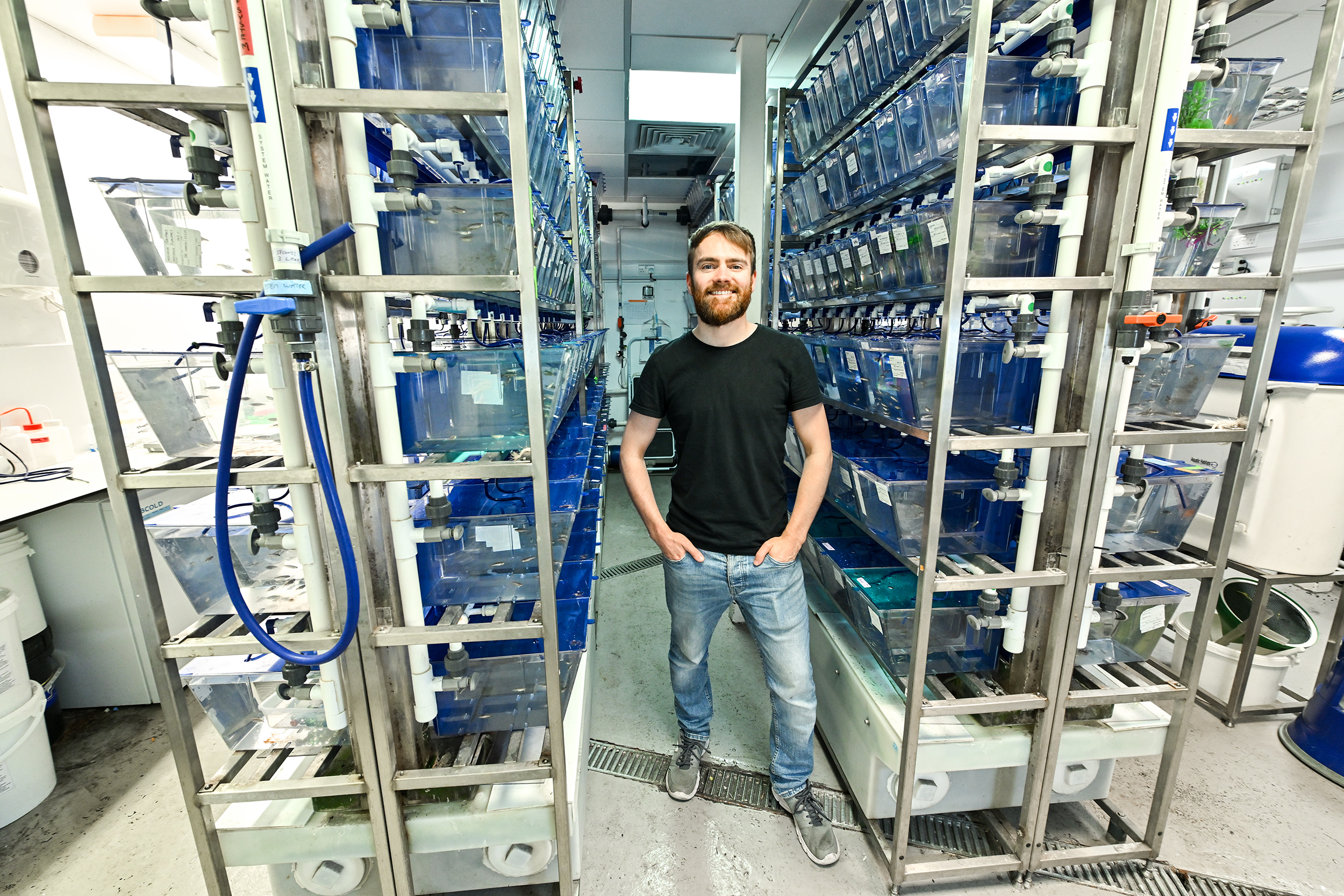Technician Week 2024: Jonnie Smith – Zebrafish facility

Jonnie works as a Zebrafish technologist looking after several thousand tropical fish spread over three rooms on the ground floor of the Central Building.
What was your route to becoming a technician?
I did a PhD in Developmental Biology in Aberdeen looking at the mechanism of early eye development. When I came back to Edinburgh, I worked as a Postdoc at Roslin for two years. When that position finished, I started to look for research work and the technician job became available in this facility. I thought it was a good stepping stone as I would be working alongside researchers.
I had used Zebrafish previously in my work for my PhD and I was interested in continuing that on. Since the facility in Aberdeen was so small, the husbandry fell to me, so I had a lot of experience looking after fish.
How does your educational background help you in your job?
I can have more in-depth research conversations with the researchers as I’m interested in their work and I’m always happy to help them.
I am doing part-time work with Shipra Bhatia, in Wendy Bickmore’s group, looking at the role of genetic enhancers in regulating the pace of eye development. It’s work that fits with my PhD. If I could go back and do something with that, it would be really interesting.
What does your typical working day look like?
Predominantly, I’m focused on fish care. I’m the one who makes sure the animals are fed. We also do daily health checks to assess the health in each tank and make sure the equipment is running correctly. We need to ensure the conditions we keep them in are the best because that impacts on the research.
We help the researchers if they need us to do husbandry and give advice about how to carry and handle fish. We make sure animal health is being maintained, as well as maintaining genetic lines for researchers so they don’t have to start them themselves. The fish need to have strong variable backgrounds. We have AB and TU wild-type lines and researchers can bring in fish from other facilities with different genetic backgrounds.
We have certain behaviours we look out for such as if some fish are being aggressive. Males might start to bully each other or larger females might start to bully males. If the fish can’t be isolated, we introduce barriers to allow fish to have somewhere to rest up. Some fish, depending on genotype, need to be isolated. If researchers are bringing up a unique genotype, we can’t put them into a tank because they need to be identified.
Most of the time they are in a healthy group as we want to promote good breeding.
What else do you do in your role?
We do a lot of public engagement. As a technician, most of the work we do is relatively solo. It’s good to do outreach and talk to people who aren’t from a science background but it can be quite a challenge to translate it so they understand. We’re quite open people as technicians. People ask us lots of questions and are surprised we hold fish health in such high regard.
These conversations are important. We can explain to them the rationale so they better appreciate why we use fish in experiments. They would prefer we use cells instead of animals, but there are certain reactions you can’t get in cells. It’s a difficult one. You can’t study diseases without modelling them in animals. We try to be compassionate.
The advantage of working with fish over other animals is that you can get embryos out of a fish without having to kill them. One female can give an average of 80 embryos a day with one pairing. Zebrafish develop within 24 hours – they go through all the major stages of developmental biology in a shorter time. You can also do live imaging.
Are there rules you have to follow when working with animals in research?
We have strict rules and responsibilities in the facility geared around animal health. We have to teach people the particular procedures that need to be followed. Most people understand fish health is the most important thing and they are willing to give up on a line of enquiry if it affects that. If the research starts to impact fish health negatively – if they are showing any signs of ill health or forming odd behaviours – we dispatch the fish.
We feed them in a way to support as much breeding as possible but if the animals are not used for a period, the eggs build up in them. Sometimes it gets to the point where we have to dispatch them or catch them to dispose of the eggs.
We’re legally allowed to keep fish for two years and we’re always looking at how we can improve the conditions, mainly in regard to breeding, to encourage the fish to lay more eggs so we can keep fewer fish in the facility. This is important to meet the three Rs of animal research – replace, reduce and refine, in order not to subject more animals than we need to research conditions.
If they are breeding well, then they are healthy fish.
What’s your favourite part of the job?
The facility is really flexible and I can work to my own schedule.
I like the routine part of the fish work and not having to figure out what to do next. The repetitive nature of the tech work is quite relaxing. You don’t need to think too much about it. You can think of other things while you get productive stuff done.



